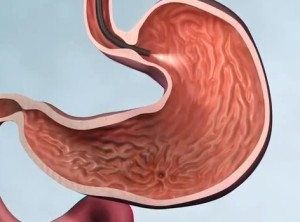What is a bleeding ulcer ?
It is a condition that occurs as a result of severe erosion in the upper digestive tract. People suffering from this condition attribute it to a variety of reasons and some develop the condition more quickly than others. The ulcers could be less than an inch or more than a couple of inches in size. Oftentimes, the affected individual does not know about the problem until the symptoms become alarming, such as throwing up blood and passing black stools.
People with bleeding ulcer should seek prompt treatment because the bleeding may become more severe and invade the blood vessels. The condition requires hospitalization and patients are often treated in the intensive care unit. Early detection and timely treatment can aid in resolving the unpleasant and discomforting symptoms as well as prevent complications caused by internal bleeding.

Bleeding Ulcer -Causes
In bleeding ulcer, an area in the lining in the upper digestive tract is deeply eroded. The upper digestive tract is composed of the mouth, esophagus, stomach and small intestine. An ulcer or sore in the esophagus is called esophageal ulcer; meanwhile it is referred to as duodenal ulcer if the duodenum in the small intestine sustains a sore. In case the sore is located on the stomach, it is medically referred to as gastric ulcer. The term “peptic ulcer” is used when the sore is found on the duodenum and stomach.
There are several factors that can trigger the emergence and bleeding of ulcers. These are:
- Infection
Majority of the cases of bleeding ulcers happens as a result of an infection brought about by H. pylori (Helicobacter pylori) bacteria which disrupt the production of stomach lining in the stomach. The lining protects the stomach from being eaten away by the digestive enzymes. Digestive enzymes are acidic and without the lining, the stomach will swell and eventually start to bleed. Anyone can get the bacteria from other infected individuals.
- Medications
The condition may also be caused by certain medications, and NSAIDs (non-steroidal anti-inflammatory drugs) are notorious for that. These drugs prevent the production of prostaglandins which protect the lining of the stomach from sustaining injury caused by stomach acids. Blood thinners, corticosteroids and anticoagulants can also trigger bleeding.
- Smoking
Smoking is another contributing factor for gastrointestinal bleeding. The stomach acids increase and become more concentrated with nicotine. Nicotine also prevents ulcers from healing quickly.
- Alcohol
Alcohol increases the production of stomach acids which can erode the stomach lining.
Bleeding Ulcer – Symptoms
Gastrointestinal bleeding is hardly noticeable during its early stages. This is the reason why affected individuals only learn about the problem when the condition has taken its severe form. Even so, it is possible to detect the condition early if the patient knows the warning signs. These are:
- Weight loss
- Weakness
- Heartburn
- Strange fatigue
- Anemia
- Difficulty in swallowing
- Burning sensation in the abdomen
- Abdominal pain
- Constant hunger pangs even after meal
- Dizziness after standing up
- Breathing difficulty
- Throwing up blood
- Blood-tinged stool or black stool
Who suffers from Bleeding Ulcer?
Some people are more susceptible to develop the condition and this is because they have the risk factors of bleeding ulcers. It is very important for high-risk people to act accordingly upon experiencing the symptoms of bleeding ulcer. Studies showed that the condition is more common in people who are:
- Affected by H. pylori infection
The H. pylori bacteria have been known to affect the normal production of stomach lining which protects the stomach from getting harmed by the stomach acid.
- Living an unhealthy lifestyle
Drinking alcohol and smoking have been associated with gastrointestinal problems because they have components that stimulate irritation to the lining of the upper digestive tract.
- Taking certain medications
The continuous intake of offending medications like NSAIDs, corticosteroid and anticoagulants can irritate the digestive tract and result in the ulcer to bleed.
- Eating spicy foods regularly
Spicy foods have been associated to bleeding ulcers because of their ability to irritate the digestive tract.
- Stress
Stress has long been associated with the emergence of various health problems, including bleeding ulcers; whether it is due to emotional or physical stress.
Diagnosis of a Bleeding Ulcer
Early detection of the condition is quite challenging because the early symptoms are mild. It is for this reason that suspecting individuals should never disregard typical digestive tract symptoms and visit the doctor immediately for accurate diagnosis. Diagnosing the condition involves checking the medical history of the patient, conducting a physical exam and asking the patient about his/her symptoms. The doctor will then perform various tests to determine the location and severity of the ulcers, such as endoscopy, colonoscopy, esophagogastroduodenoscopy, Barium X-ray, sigmoidoscopy and anoscopy.
Bleeding Ulcer – Treatment
The treatment aims to help patients avoid the dreadful consequences and medical complications of bleeding ulcers. Its objective is to stop the bleeding and treat the underlying cause. Treatment for bleeding ulcer may involve taking prescription medications, sticking to a balanced diet and living a healthy lifestyle.